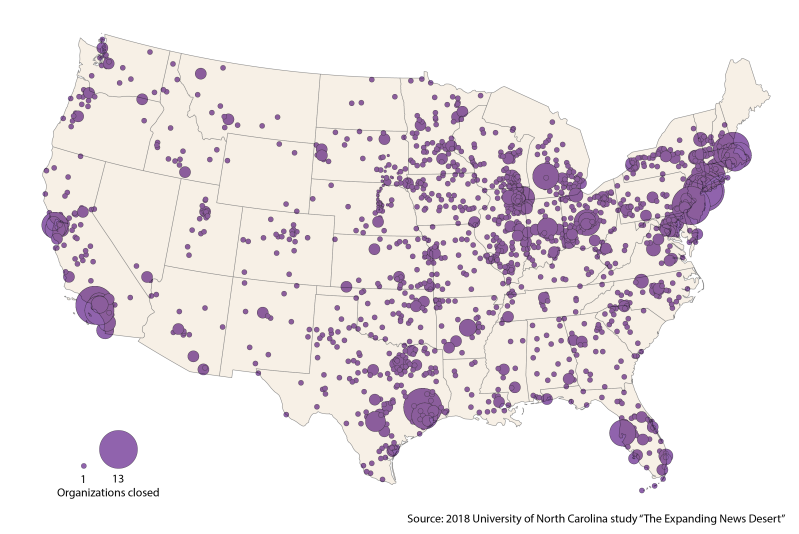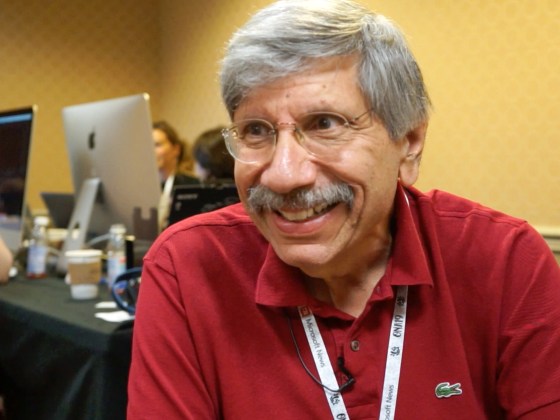Ann Maloney was a food and dining writer for The Times-Picayune in New Orleans when she found out on May 2 that the newsroom had been sold to a local businessman who owned the competing media organization, The Advocate.
When Maloney and her colleagues started being let go from their jobs that same day, it came as a shock to her. At the Times Picayune was that way, “once you got a job there, as long as you did a good job, you’d stay employed. They had a job security pledge.”
Ann wasn’t alone. The loss of advertising revenue combined with when the Great Recession struck in 2007 led to widespread closures of media organizations across the United States. An analysis of “The Expanding News Desert” data set from the University of North Carolina demonstrates the breadth of these closures from 2004 to 2019.

Everywhere that people live, media organizations were closing. But some areas were hit harder than others. For example, around one in five shuttered daily media organizations were closed in just two states — Arkansas and Kansas.

In an especially hard hit area, around one in eight of the total number of closed weekly media organizations were located in Illinois and Ohio. Additionally, closures hit Indiana and Pennsylvania particularly hard.
While the East Coast saw a greater loss of media organizations during this period, the population in those areas was much greater. The Rust Belt closed fewer papers but those were more devastating because of the lack of other daily and weekly organizations to pick up the slack.
‘I am always expecting to get laid off again’
Journalism was not the only field seeing seismic change. “It’s not that you’ll choose something else and you’ll be totally secure,” Maloney said. “I have family members and friends that work in other industries. The way that we work in America is challenging. Contract work, independent work is growing.”
Maloney started noticing people getting laid off in other industries. Friends from all over the country were getting laid off.
“If you’re surprised by major shifts in things like this, then you’re not paying attention in journalism today,” Maloney said. “So, you’re always sort of have to look over your shoulder these days. It was a surprise that the way it went down.”
Leezel Tanglao, the Deputy Managing Editor of Membership and Innovation at the Huffington Post, has been laid off twice due to staff restructuring.
“I am always expecting to get laid off again,” Tanglao said.
When she was laid off in 2018, Tanglao had been in the industry for about 14 years. Trying to figure out what to do next, she started her own LLC and worked part time at the Associated Press.
“It’s like a roller coaster up and down because I think any time there is a change in your life, as much as like a job change or a job gets eliminated, you suffer some type of loss,” Tanglao said. “There is grief that comes out of that and just in general, anytime you suffer a loss it’s like ‘oh god, what do I do?’”
‘This country needs you in this field’
Even though Maloney is now a freelancer, she still continues to cultivate her relationships with her colleagues from the Times-Picayune.
“We are all meeting up tonight for drinks at a bar in town, we all meet up for lunch. We are all Facebook friends, we stay in touch, we help each other with things,” Maloney said.
Tanglao advises those in similar situations to not wait and look for a job when it’s needed and to always continue building relationships with others in the field. Networks will carry you through the very challenging times, she says.
“I’d rather know where the fire exits are than last minute when there is a fire in your face,” Tanglao said.
What has gotten Tanglao through this time in her career was knowing that it’s temporary.
“I’ve seen other folks who have gone through this recently as well and it’s just easy to fall into ‘Oh my god, nothing is happening. It’s always going to be like this.’ It’s not. It’s all temporary,” Tanglao said.
During this process, Tanglao walked away from her daily job and focused on herself and picking up new skills such as podcasting.
“This whole thing has shown me that there is so much more than dealing with the daily news grind and taking a step back and being okay with it,” Tanglao said.
Maloney encourages fellow journalists to do their absolute best and learn as much as they can.
“You’re coming into an industry that was once fat and happy and it isn’t (now), but it’s vitally important to democracy and America, and you should be proud of that and you should take great pride in it and do your absolute best,” Maloney said. “People need you in this field, this country needs you in this field.”







You must be logged in to post a comment.